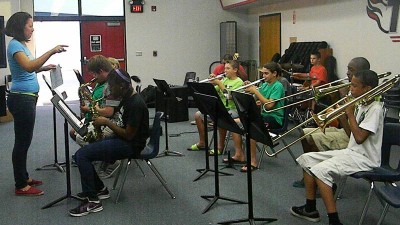“About half the schools where kids come from don’t have jazz programs. So, for them, Milestones is it,” says Page. “Jazz builds a kid’s confidence. If you can stand up in front of an audience full of people and play a solo, what else in life is going to bring you down?”
Jazz educators direct the program’s five ensembles. Mandolinist and violinist Eva Scow works with an intermediate group of seventh-, eighth- and ninth-graders. Jazz is stimulating for them, she says. “It’s like learning how to speak another language. They’re all pretty competent on their instruments already. I don’t have to teach them how to play, so we can get right into improvisation and finding their own voice in this style.”
In fact, she begins the class with that very idea. “Our goal in Milestones is to teach you how to play jazz, but also to teach you how to play together, right?” Scow says to her group of eager students. “So playing in a jazz band, you’re going to come across a lot of different things that maybe aren’t going to be on paper or maybe you’re not going to be comfortable with or used to.”
Seventh-grader Leo Parrigilli says he likes being able to experiment with notes. “When you improvise, that’s where the creativeness comes in and even when you’re reading music, you can add little dynamics. You can do trills or maybe do a note that’s maybe a slightly bit higher, and it just makes it sound awesome with the rest of the group.”
Leo says he’s learned so many things through Milestones. “Like how to fix my ambusher, how to play my notes better and have a better airstream,” he says.
Scow plays a tune over the speaker and asks the class where samba originated. “Rio,” someone yells out. “Yes!” she replies. “Oh, my goodness! First try. Brazil. So this is a Brazilian rhythm,” she says and asks for a bossa nova beat. The drummer begins, followed by the bass player.
Scow asks someone to demonstrate the melody and eighth-grader Daeshavon Ricks raises her hand. She plays saxophone and says she loves Charlie Parker and John Coltrane.
Daeshavon says there isn’t a jazz program at her school, but when she heard a Milestones group play she immediately loved the sound.
“I had never heard of jazz. And the way that they played, it just really touched my heart,” she says. “What I like about jazz is that you can improvise and be yourself when you play.”
Daeshavon says she got a scholarship to join Milestones. “I live with my mom. She’s a single parent, and wouldn’t be able to afford it with four other kids,” she says. She’s quick to note her family loves to come hear her play.
Milestones operates under the nonprofit Jazz Fresno and has an open access policy. It doesn’t turn away any kid who really wants to participate, Page says. The project runs on grants and donations; the students help with fundraisers to bring in extra money.
"This program, really it’s all about partnerships,” Page says. “We started out with the schools. Last summer, we provided scholarships to go to our summer program. And in return, two school districts are providing facilities for us for our school-year program at no cost.”
Classically trained violinist Scout Whitaker, 14, says she just started playing with Milestones this year. “I’ve never played jazz before,” she says. “There’s a form that you follow, but it’s much more relaxed. It brings more improvisation that really doesn’t happen in classical music, but it’s such an important musical quality.”
Still playing the Brazilian rhythm, Scow turns to Scout and asks, “My sight reader over here. Are you feeling comfortable with it? I bet you could play that, right? You wanna try? Are you feeling it?”
Scout picks up her violin and, by the end of tune, everyone in the room is clapping for her solo.
“I feel like it’s truly music because it’s emotions that you’re trying to portray. It’s not emotions that were written down for you,” Scout says. “It’s improv. You make it up as you go, it’s what you feel.”
Leo puts it another way. “Jazz is just so fun!” he says.
